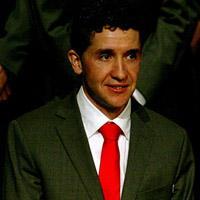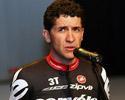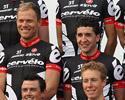
Recently on Cyclingnews.com |
An interview with Carlos Sastre, February 4, 2009
Carlos Sastre: The dark horse rider
After 11 seasons in the pro peloton and at the age of 33, Carlos Sastre’s career hit a new high point when he won the 2008 Tour de France. The Spanish veteran spoke to Cyclingnews’ Shane Stokes about his Tour victory, his move to the new Cervélo team and the path towards those three weeks in July.

|
Carlos Sastre's been a professional rider since 1997, when the whippet-like Spaniard joined Manolo Saiz's ONCE squad. Despite now being one of the most seasoned campaigners in the peloton, he felt a little dwarfed by the physical presence of teammates such as Fabian Cancellara at last year's Tour de France. "I felt like a small chicken," Sastre says with a smile. "A small guy between all the big guys in the team."
It's hard to imagine any of the recent winners of the Tour de France saying that about themselves. Yet when Sastre describes those emotions of riding onto the Champs Élysées in a bright maillot jaune, it's in keeping with his character; down to earth, human, not taking himself too seriously.
Self-deprecation aside, it was also a very proud moment. "It was great to arrive in yellow with all my team-mates, and also being the team classification winners too," he says enthusiastically. "That was a special moment for all of us... it was the first victory in the Tour de France for my previous team, and I think it was something really special with all of them."
Sastre's win in the Tour was unexpected. True, he'd been one of the most consistent Grand Tour riders in recent years, having taken 20th, 10th, ninth, eighth, 21st, third and fourth in the Tour editions between 2001 and 2007. The Vuelta had also brought the same kind of results, starting with the King of the Mountains classification and eight overall in the 2000 Vuelta, then sixth, second, fourth and second again between 2004 and 2007.
Considering that he had taken just six pro victories at that point in his career (including two team time trials and one criterium), few envisaged him scaling the top step of the podium in France in July. Instead, riders such as Cadel Evans, Alejandro Valverde and Denis Menchov were all favoured as more likely winners by the bookies.
"As soon as we finished the Tour de France, Gerard Vroomen talked to me about his project... without thinking too much, I decided, 'Okay, I will go with them'."- Sastre talks about how he came to sign for the Cervélo team. |
How wrong they were.
Sastre went into the Tour after a very quiet spring. He was ninth in the Tour of Murcia, 24th in Liège-Bastogne-Liège, and only 20th in the Dauphiné Libéré.
Still, he didn't worry. "I knew that I was ready for the Tour de France," he said. "You never know what can happen during the race, if you can win or not, if you can be on the podium or not. But I took it easy, step by step, taking the right decisions. It is what I did. I didn't have a big goal in my mind, I enjoyed every single stage."
Sastre rode the perfect race, quietly moving up the general classification and then making his big move just five days from the end. Starting the day fourth overall, he attacked hard at the bottom of Alpe d'Huez, drew clear of all the other challengers (nearly breaking Menchov in the process, the Russian being the only rider who tried to match his acceleration), and soloed to both the stage win and the yellow jersey. He then finished a solid 12th in the final time trial and ended the race 58 seconds clear of Evans.
"That day I knew that I had my opportunity and I had to fight for it, and that is what I did," he explained. "If you wait until the last part of the climb, you cannot make a big difference. But if you attack on the bottom, you see more things about your rivals and yourself. I knew that I am a climber, a pure climber, and that I had to do my best on that climb, to dig deep in order to get my goal. I succeeded, taking the stage victory and the yellow jersey. It was a really nice day."
 |
Sastre is only the third rider in history to take the stage win on Alpe d'Huez, have the yellow jersey at the summit and go on to win the race in Paris. Before him, Fausto Coppi in 1952 [the first time the climb was used] and Lance Armstrong in 2004 were the other two.
He might not have been aware of that statistic – or indeed the fact that on 22 out of 25 occasions, the victor on the mountain didn't go on to win the race – but he also didn't have time to worry about what would happen between the summit of that 1860 metre Alpine peak and the boulevards of Paris.
"At that moment you are very happy because you win and you get also the yellow jersey," he explained, casting his mind back to the emotions of that day. "But you don't have any time to think about it. You are talking, talking, talking to the media, and you are thinking about the day after because you need to recover and be ready for it, you know?
"Of course, all the memories that I have are really nice. We had a big party with all of our sponsors in the hotel, with Cervélo and CSC and all of the important people of the team. I think that everybody has really nice memories about that stage and that made me happy."
Since then, all has been different. Functions, appearances, countless interviews, awards; Sastre has done them all, experiencing the hullabaloo that transforms the life of the sport's biggest champions. "My life around me has changed hugely... not everything, but almost everything," he explains. "That said, my own life, my private life, is as before - I am the same person. Two kids, my wife, two dogs... We are happy. I try to keep it like this."
New look, similar goals
Other than experiencing life as the Tour champion, another very big change for Sastre is the jersey he will be wearing in 2009. He decided to leave the CSC Saxo Bank team early last summer, perhaps recognising that the other talents on the team would be making things very crowded at the top before too long. That seems a wise choice, given that many regard Andy Schleck as a future winner of the Tour de France. Sastre had already ridden as a super domestique for Ivan Basso, and had no desire to return to that role.
"I knew before the Tour de France that I wanted to change my previous team," he says. "In this life you have make decisions that help you, and that also help your previous team, your team-mates. I don't want to be an obstacle for anyone in this life. I got my goal, I made real my dream with the team.
"Before that, I didn't want to split the team. I had seven nice years there and I didn’t want to split that harmony, that atmosphere," he continues. "It was in my thoughts before the Tour de France [to change]. Afterwards I heard about this project [Cervélo] and I thought that maybe it could be a good idea to build a new team, and also would be good for my previous team.
"That decision can help me and can also help to these new talents, the Schleck brothers and other riders - they have more freedom and they can progress if they have those conditions. That is why I changed."
Being the Tour de France winner meant that several other squads were fighting for his signature. The new Katusha team was heavily rumoured to have been involved and has a very considerable budget; the Cervélo Test Team is a smaller setup in terms of their cash armoury, but for Sastre that was the most enticing choice.
"Of course, if nobody talked to me about this project [Cervélo], maybe I would have chosen another team," he said. "But as soon as we finished the Tour de France, Gerard Vroomen [Cervélo co-owner] talked to me about his project, his idea, and without thinking too much, I decided, 'Okay, I will go with them'. I like the project, I like the philosophy and those two things were the main reasons," he says.

|
For the first time in his career, Sastre will start a season as the clear leader of a team. At CSC he rode for Basso and, while he took over as team captain in 2006, Frank, then Andy Schleck came to the fore in 2007 and 2008. It deflected some of that attention away from the Spaniard's ambitions. Now all eyes will be on him however, especially as he will be wearing the number 1 dossard in this year's Tour.
He seems ready for that role, and is looking forward to developing the squad. "I am doing this together with Thor; we are the columns of this team," he explains. "I feel really happy with Cervélo. We have a really nice atmosphere. We have a lot of work to do. At the moment, the most important part is to make a good foundation, a good base, and we can build the team later.
The Tour de France teams have not been announced, but it would be almost inconceivable for Cervélo to be left out. Sastre is defending champion, Hushovd has had much success there in the past, and the image of the team is new, interesting, based around the bicycle industry and - importantly - clear of any whiff of scandal. Cervélo isn't a ProTour squad but hopefully that won't matter to ASO.
Sastre is confident that they will line up for the Tour and, indeed, speaks as if it has been privately confirmed to him already. "We have a place in the Tour, we have a place in the Giro, we have a place in the Vuelta," he says. "We have got a lot of respect for the big organisations and we have an opportunity to do the best races in the world. Honestly, with this project we have a lot of open doors, and it is because of respect. They respect the project, they respect myself. I am really happy to hear that."
Sastre's move to this new and untested team will likely place him back into the role of underdog when it comes to the Grand Tours. Even with the respect demnaded of the defending Tour champion, the bookies will probably follow the pattern of last year and hand favourite status to the other challengers.
Astana looks very strong on paper and the big news about Armstrong's return will generate a lot of the headlines, grab much of the pre-race hype. If so, that will suit Sastre just fine. He seems to slot well into the role of dark horse; he is a modest, self-deprecating character, someone who jokes about looking like a chicken in yellow. But if the lessons of 2008 are to be heeded, he certainly shouldn't be written off.
Related articles:
Interview - January 2008: Grand
Tour prospects still on the rise?
News feature - July 24, 2008: Living
in the moment
News feature - July 27, 2008: Sastre's
sacrifices pay off
News feature - August 8, 2008: Champion
with a heart
Photography
For a thumbnail gallery of these images, click here
Images by Shane Stokes/Cyclingnews.com
- Carlos Sastre will be Cervélo's leader for the 2009 season after moving there last year.
- Carlos Sastre and Thor Hushovd pose for the team photo.
- Carlos Sastre with Rotor reps at the team's launch.
- Everyone wants a piece of Carlos Sastre including TV networks and other media.
- Carlos Sastre in the Cervélo kit addresses the audience.
- Answering a few questions is all part of the service for Carlos Sastre.
- Sastre speaks to the audience at the Cervélo team launch.
- Carlos Sastre in the spotlight at the Cervélo team launch.
- Carlos Sastre and Cervélo owner Gerard Vroomen pose together at the team launch.
